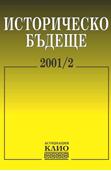Едно възможно бъдещо малцинство (Сондажно изследване на общността на българите имигранти в Сейнт Пийтсбърг, Флорида)
A Possible Future Minority (A Sample Survey of the Community of Bulgarian immigrants in St. Petersburg, Florida)
Author(s): Margarita KaramihovaSubject(s): History
Published by: Асоциация Клио
Keywords: minority; Bulgarian immigrants; St. Petersburg; Florida
Summary/Abstract: This article gives a concise account of a comparatively new Bulgarian immigrant community in St. Petersburg, FL, and St. Louis, MO, U.S.A. It examines major reasons for its existence in a variety of amorphous, partially overlapping communities that do not exhibit an aspiration to institutionalize. The lack of group tensions and the need for group protection on the one hand, and the absence of any particular strata whose interests need to be protected, on the other, make the homogenization of the community superfluous. It exists via a multitude of smaller communities organized on professional, neighborly, friendly, or family principle, which are sufficiently open and with flexible boundaries. At this stage these factors provide adequate conditions for implementing individual and group strategies. The predominance of new immigrants, who are still in the process of adaptation and obtaining statute, conditions which to a great extent lack the need for a more stable union and clearly voiced positions. The comparatively problem-free existence of the community does not require any special assistance efforts on behalf of the state or federal authorities. Emigration in the recent years is a matter of personal or family choice that is met with a relatively positive understanding by the authorities on both sides. New immigrants are not united by a single ideology, as was the case with political immigrants in the 1940s and 50s. All of the above mentioned factors, combined with no continuous active process of their integration into the community, leaves them for the time being open, adaptable, and free of need to institutionalize.
Journal: Историческо бъдеще
- Issue Year: 2001
- Issue No: 2
- Page Range: 194-217
- Page Count: 24
- Language: Bulgarian
- Content File-PDF

